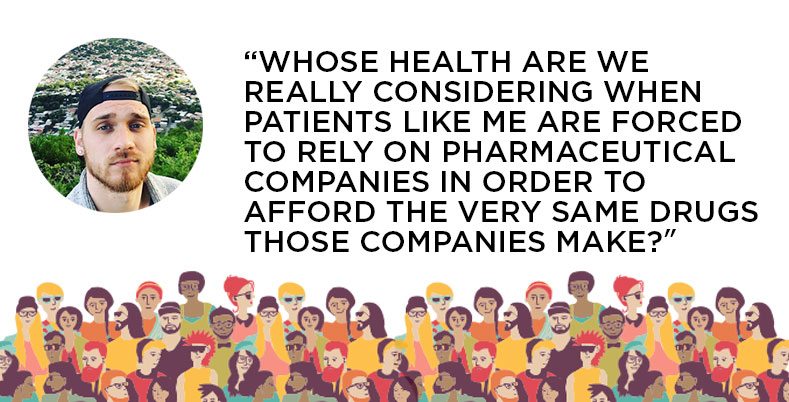By: McKenzie Shappell
I am 25. Anyone my age is keenly aware of that number and shares my anxiety as they contemplate the very real cost that one more birthday represents.
While many of us have long been forced by circumstance to manage our health care alone, still more of us are now preparing to face that hydra as we prepare to age out of our parents’ insurance plans. In a matter of months, I will join the throngs of Americans chasing the elusive specter of continuous employment (at 25? Please.) or taking their chances on the exchange. This is the anxious reality for the vast numbers of us in need of medication to treat chronic and temporary conditions, battle mental illness, and prevent diseases.
As a gay man, I’m considered to be part of a high-risk community—one where the chances of contracting HIV through sexual contact are greater than for most other groups. Like countless others in my community, I use a pre-exposure prophylaxis drug known commonly as Truvada, to prevent the spread of HIV from person to person. Truvada is also often utilized in the treatment and management of HIV itself and is therefore vital to the health and welfare of people across the spectrum of sexual orientation.
Obtaining this drug was a study in patience—reading the fine print and asking the right questions. Receiving a prescription was not difficult. But the surreal experience of budgeting each paycheck just to make it to the next one, only to be told by a pharmacist that a one month supply of pills will cost $1,700, does things to a person’s blood pressure that must certainly be some kind health risk in and of itself.
It is imperative that we pass legislation that gives those of us who rely on prescriptions control over our access to them and removes it forever from the hands of those who profit from them.
Between my depression and sexual health, paying for my pharmaceutical needs has evolved into the set-up for a bad joke, involving overlapping insurance plans, two hospitals, multiple pharmacies, and finally, the use of a medical assistance program provided by the same company that manufactures the drug.
The gap between receiving the prescription and obtaining the drug was an unnecessarily prolonged one, leaving me un-medicated for a time. This type of story is a shock to no one. The whole experience was just one in a long list of anxiety-plagued interactions patients experience day-to-day in the rigged labyrinth of our healthcare system.
Were it not for previous experiences with this particular drug and its manufacturer, I would have remained unaware of the potential for financial assistance, and this medication would have remained out of reach.
This final element, a financial assistance program administered by the drug’s manufacturer, is the most perplexing of all. Whose health are we really considering when patients like me are forced to rely on pharmaceutical companies in order to afford the very same drugs those companies make?
I joined my current insurance plan in December. I almost laughed when I read my deductible for the first time—$6,500 as an individual. I can see why people question the good of ever purchasing insurance when I consider the financial barrier between me and actually reaping the benefits of my coverage.
Without financial assistance, I would have already been expected to pay off my deductible, out-of-pocket, on prescription drug costs alone. Since December, the cost of my PreP has totaled over $10,000. That number accounts for a mere six-month supply of one drug.
I am privileged to have a physician as a mother, experienced friends and family in the LGBTQ community to guide me, and employer-provided health insurance. A person should not have to have an advanced medical degree, a team of empathetic supporters, and steady employment in order to afford the basic medications they require to live and thrive.
Yet, the price of drugs in our state continues to spiral out of control and out of reach for too many of us.
It is imperative that we pass legislation that gives those of us who rely on prescriptions control over our access to them and removes it forever from the hands of those who profit from them. Health can no longer be treated as a luxury consumer good, reserved for the affluent.
We all have a health care story, because health care is a basic, fundamental need. This is part of a weekly series during Minnesota’s legislative session where we share the health care stories of Minnesotans like you. Share your story here.

